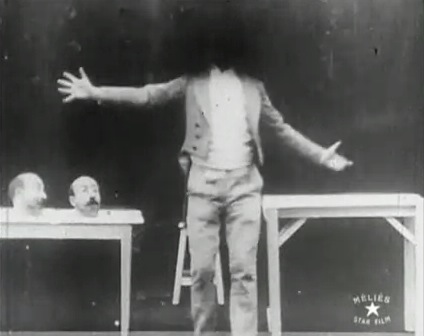There is a story about an English colonial administrator, who, during the first world war and for some time after it, lived in a backward community. He regularly received newspapers and periodicals from home, thus knew of films, and had seen pictures of the stars and had read film reviews and film stories; but he had never seen a motion picture. As soon as he reached a place where there was a cinema, he went to see a film. A number of children around him seemed to enjoy it very much, but he was completely baffled by what he saw and was quite exhausted when at last the film came to an end.
'Well, how did you like it?' asked a friend.
'It was very interesting,' he said, 'but what was it all about?'
He had not understood what was going on, because he did not understand the form-language in which the story of the film was told, a form-language every town-dweller already knew at that time.
—Bela Balázs, 'The Colonial Englishman,' Theory of Film, 1952, 34.
? ? ?
Back in Fall 2011 Mimi Thi Nguyen and I put out a call for papers for a Society of Cinema and Media Studies (SCMS) panel called 'Something Missing: Transnational Discourses and Practices of War, Embodiment, and Vision.' We want to consider someone missing something,
—in which the face, a limb, or a particular sense (sight, for instance) functions analogically to impede another’s cognition or premonition of interiority or humanity. Henri-Jacques Stiker observes that at the scene of modern war, personhood is violently made partial in body and also mind: 'Mutilation applied to all alteration of integrity, of integralness. It amounted to a degradation, but one by removal—or deterioration—which has the effect of suppression. The maimed person is someone missing something precise, an organ or function.' We extend this concept to the age of hypervisibility and screen culture. This 'missing' or unseen part that blocks recognition—because it is covered, obscured, or otherwise absented—becomes a microsite for surveillance, incarceration, rehabilitation, even imagined or actual death. We especially seek papers that explore the consequences of sovereign powers and governmentality 'restoring' a sense, function, body, or organ that aligns the target once again with a regime or liberal government.
The SCMS convenes during 21-25 March in Boston (schedule). The 'Something Missing' panel takes place on Thursday, 22 March, 3:00 - 4.45 pm (Session H) in Room H25 of the Boston Park Plaza Hotel. Our presenters (we are sad that Mimi is unable to be present) include: University of Massachusetts-Boston Professor Emeritus Linda Dittmar on phantom memory in Waltz with Bashir; UnionDocs programmer and Columbia film studies master's graduate Neta Alexander on war, cinema, and 'olfactory unconsciousness'; University of California-Berkeley doctoral candidate Simona Schneider on early cinematic representations of Muslim prayer and the 'guillotine effect'; and yours truly on concealed faces and the battleground of fashion.
Since the SCMS is a ticketed (and costly) event and we want this work to reach an engaged public, this space may get updated with a summary or gateway to the talks. The Twitter hashtag is #scms12.
